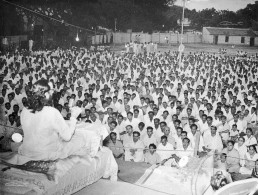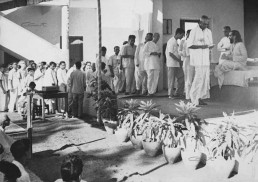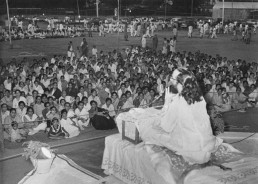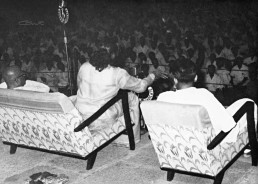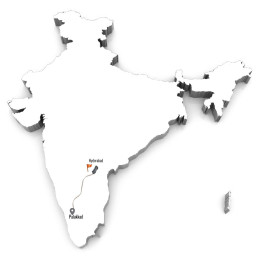
Jnana Yajna 86

Year & Dates:
May 11, 1961 to May 21, 1961

Yajna Topic:
Shrimad Bhagavad Gita- Chapter 3

Place:
Hyderabad, India.
Act we must from birth to death, emphasizes Bhagavan Krishna throughout Srimad Bhagavad Gita, and He also specifies that actions must be such that they prepare, purify, and integrate the body, mind, and intellect of seekers. Thus steadied and selfless, such seekers can undertake a successful final pilgrimage of Self-enquiry, for the rediscovery of the Omnipresent, Omnipotent, and Omniscient Divinity. So, to make life itself a worthwhile pilgrimage, Pujya Gurudev echoed the message of Bhagavan Krishna, bringing out the glory of action in His discourses during the 86th Jnana Yajna.
“Man, from being a mere laborer, develops himself to be a worker. This humanizing and divinisation of work forms the subject matter of Chapter 3 – titled” Karma Yoga” said Pujya Gurudev at the exhibition grounds in Hyderabad in the evening of May 11, 1961. The thousands who were present had already tasted the sweetness of His Vedantic discourses, and they were waiting to understand the path of uplifting action.
Igniting Knowledge Beyond Action
Earlier, in the august company of Swami Pranavananda of Gudivada (Vijayawada), Pujya Gurudev had been welcomed ceremonially. After the Om flag signaled the onset of Vedantic vichara, Swami Pranavananda, revered as a ‘Vision Teacher,’ spoke in chaste Telugu about the significance of the Gita for spiritual growth and the lasting contribution of Pujya Gurudev’s Gita Jnana Yajnas. Then, expressing His happiness for being back with the sincere audience in Hyderabad, Pujya Gurudev commenced talking about the wisdom in embellishing materialistic progress with rejuvenating value-based living. The stage was set to analyze the path of right action in the following days.
On the morning of May 12th, it was the turn of Hyderabad’s twin city, Secunderbad, to offer another effusive welcome to Pujya Gurudev who was again accompanied by Swami Pranavananda to the grounds of Keyes Girls’ High School. In that venue, Pujya Gurudev had chosen the topic of the poetic Kaivalyopanishad.
Outlining the Upanishadic thought-process, Pujya Gurudev said: “When Shraddha (faith) is more and more, Bhakti will automatically develop; and, when Bhakti comes, automatically Jnana will dawn. The analogy of the “Churning of the Fire” symbolizes the Jnana Abhyasa. When the personality is withdrawn from the Body-Mind-Intellect, the fire is ignited. Then the Paasha or bondage is burnt down. The spark of ignition, of understanding, does not result until we rub ourselves off our negativities The sparks of ignition thus generated is ‘that Energy which, ‘passing’ through the equipment gets the required work done because none of the instruments can function without the ‘I’ presiding over them.”
At Hyderabad and Secunderbad, the discourses in both yajnashalas reinforced both the path of deep introspection and liberating action. Over 5000 devotees followed Pujya Gurudev as He moved from Karma Yoga to the state of Kaivalya, swept and spellbound by His erudite knowledge and dynamic functioning.
For Reflection: Pujya Gurudev had almost a magical ability to make thousands churn their minds in unison on the most sublime concepts of Vedanta, simultaneously tasting the cream of the Upanishad and the Gita.
Photo Gallery
In the embrace of the spiritual talks by Gurudev, young toddlers, girls and women find not just knowledge, but a sanctuary where their voices are heard, their spirits uplifted, and their potential unleashed, igniting a ripple effect of transformation across generations and societies!
Swami Chinmayananda during 86th Yajna
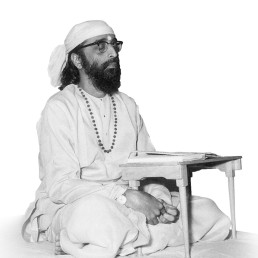
“Think,” Says Pujya Gurudev
Man is encouraged to follow a life of action only when he comes to appreciate that way-of-life completely in his understanding. When the very theory is decried, it is not conducive for the intellect any longer to accept that theory. Thus, decrying a philosophy is a sign of one’s intellectual rejection of it. Having once rejected intellectually, there is no chance of an individual ever striving to live that philosophy. Karma Yoga is a way of life, and we have to live it if we want to come under its grace.
The path of work lies through a process of elimination of the desires in us. When egoism and ego-centric desires are eliminated the work accomplished through such an individual is the divine action, which is destined to have enduring achievements. To the extent man is not practicing this efficient way of work, he should grow necessarily unintelligent, and to that extent his discriminative capacity should be found deteriorating and ultimately destroyed.
From Tyagi Magazine
That the theme of the Upanishad can be experienced only through intuition has been already explained. To confirm that idea, here the Teacher totally denies all effectiveness for other methods of acquisition, in gaining the supreme Self of the Upanishads, By action and work we generally strive for and acquire the world of objects; sometimes an amount of happiness can be gained through the success of an even by the indirect help of those who depend upon us(Prajaya); an amount of happiness can be really ordered by wealth.
Direct effort, indirect help, purchase by wealth- these are the three avenues through which we come to our worldly success and happiness. We achieve happiness in daily life either through our self-effort (Karmanaa), or sometimes our self-effort is supplemented by the help we get from others (Prajayaa) and at other times, we gain happiness by purchasing it with wealth (Dhanena). None of these methods of transaction, which are available in the world of objects, can bring to us spiritual solace or subjective wisdom.
From Kaivalyopanishad Book
Don’t do this to your children!
We are influenced by external factors, such as societal expectations and the success of others, leading us to stray from our true inclinations. Recognizing and nurturing our inherent tendencies from a young age can lead to greater fulfillment and success, as evidenced by methods employed in education and career choices.
